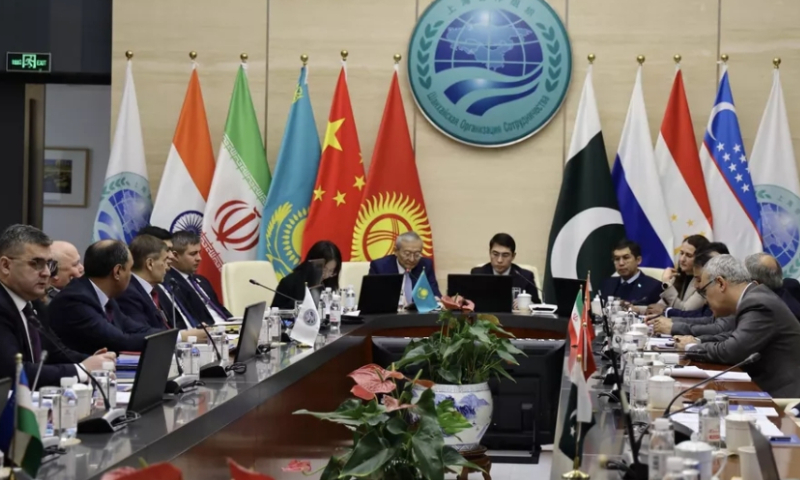
The meeting of SCO National Coordinators Council is held from January 31 to February 1. Photo: Website of the Shanghai Cooperation Organization
The upcoming elections in Pakistan do not affect its interaction with the Shanghai Cooperation Organization (SCO) or other international organizations. The SCO works with states, regardless of the government in power, said Pakistan's Director General SCO at the Ministry of Foreign Affairs, Altamash Wazir Khan.
Khan also told the Global Times that Pakistan's relationship with Iran was not a topic of discussion during the SCO meetings this time round, as there was a full agenda of about 30 issues to cover. But he highlighted the de-escalation of tensions between Pakistan and Iran, underscored by the Iranian Foreign Minister's recent visit to Pakistan.
Iran's Foreign Minister Hossein Amir-Abdollahian recently visited Pakistan, when both sides announced the establishment of a high-level consultative mechanism to oversee the progress in various areas of cooperation between the two countries, including counter-terrorism, Xinhua reported.
Khan made the above remarks during a recent meeting between coordinators of the SCO member countries and media representatives in Beijing.
The Election Commission of Pakistan had previously announced that February 8 would be the official date for the general elections in the country, read a Xinhua report. The Pakistani coordinator emphasized that the election results will not influence Pakistan's relations with the SCO and other international organizations.
He emphasized that Pakistan's main focus in the SCO is on mutual benefit and economic development, as well as humanitarian cooperation. Security is also a priority, but bilateral discussions on sensitive issues are avoided.
Regarding the SCO development bank, Khan said that experts are currently working on the drafts, and while it may take some time, progress is being made. He said that the idea is not just about constructing a building, but about creating an entire financial system which takes time for it to be realized.
When asked about Pakistan's priorities at the SCO, Khan mentioned that Pakistan's focus is on economic cooperation, financial cooperation, humanitarian cooperation, and connectivity. Connectivity not only includes physical infrastructure like roads and railways but also connectivity among people through digital platforms.
Talking about the role that the SCO can play in the Afghan issue, he mentioned that official contact with Afghanistan is currently not possible. The SCO operates on the basis of consensus, and official contact cannot be established until all member states recognize the Taliban government. Nonetheless, Pakistan does participate in meetings related to Afghanistan.
The SCO currently has 9 member states, including China, Russia, Kazakhstan, Kyrgyzstan, Tajikistan, Uzbekistan, India, Pakistan, and Iran, as well as 3 observer states, including Afghanistan, Belarus, and Mongolia.
From January 31 to February 1, the SCO held the meeting of the SCO National Coordinators Council in Beijing. The National Coordinators Council is the coordinating and managing body for the daily activities of the SCO. This council is responsible for necessary preparations for the organization's meetings of heads of state, heads of government, and foreign ministers, according to media reports.
Talking about plans for the coming months, he revealed that Pakistan is set to host over 80 events until November this year, emphasizing various aspects of collaboration within the SCO framework. Since assuming the chairmanship in October of the preceding year, Pakistan has efficiently executed more than 20 events within the last two and a half months.




